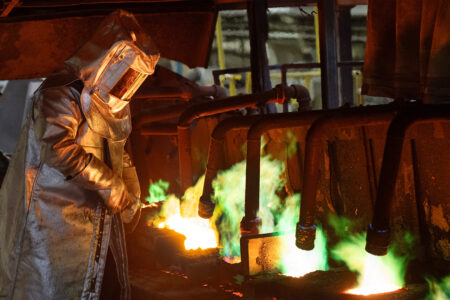
When the United States led its coalition into Iraq last year, they entered a world with new rules and different ways of seeing things. Now they find themselves having to run ever faster just to stay in place. As I write in early autumn ”œthe resistance” has just detonated three car bombs in Baghdad, killing 35 Iraqi chil- dren and seven adults. Apparently, the ruthless characters in this dark world can justify even the most unspeakably cruel actions. But do the people of Iraq, of ”œthe Orient,” truly dif- fer from us when it comes to fundamental values?
I returned to Canada in June, after eight months in Iraq. Everything I saw and experienced in Iraq convinces me that no, when it comes to fundamental things such as the value of human life, freedom and the difference between right and wrong, we of course share the same perspective as the vast majority of Iraqis. As the Americans watched images of torture in Abu Gharib prison and were horrified, so average Iraqis see civilians killed in suicide and car bombings and are horrified. In the end, this is why the terrorists will not succeed in Iraq.
Saying that terrorists will not succeed in Iraq, however, doesn’t mean that the Americans will succeed there either. Iraqis, whether Sunni, Shiite, Arab, Kurdish or Turkmen, see things in their own particular way. Elections scheduled for January may well indicate a preference for an Islamic government in the centre and south of Iraq ”” hardly an out- come sought after by the West. Iraqi Kurds in the north also seem to overwhelmingly prefer a Kurdish state to remaining in Iraq, but are allowing their leaders to play a safer game of pushing for autonomy within a loose federal system.
Now that Saddam’s regime has fallen, we can also for the first time take a fascinating look at credible Iraqi opin- ion polls. A Gallup poll conducted in March-April 2004 showed that roughly 92 percent of Iraqis felt that attacks on Iraqi police simply could not be justified, but only 47 per- cent felt the same way about attacks on US forces. A stag- gering 52 percent also thought that attacks on Iraqi police represented ”œan effort by US forces to persuade others that they need to remain in Iraq.” It seems that in societies where the secret police always hovered around the corner, conspiracy theories remain all the rage. This kind of public sentiment should also send a red flag to American policy makers ”” a clear indication that while they handily won the war against Saddam, they’re clearly losing the war for the hearts and minds of Iraqis.
Iraqis have strong views about getting their sovereignty back, establishing democratic rule and ending the occupation ”” which actually coin- cides with stated American views as well ”” meaning as soon as possible. The current intensified spate of attacks in the country, however, aims to force out Coalition troops and international agencies before they can organize elec- tions. The band of ex-Baathists, Jihadists and criminal opportunists behind most of the campaign of terror figure they have a better chance of coming to power (or in the case of Baathists, back to power) by relying on methods used to rule Iraq since its founding ”” fear, violence, and for a lucky few, large sums of money.
Not surprisingly, the same Gallup poll shows that 69 percent of Iraqis feel that cooperating with Coalition forces or Iyad Allawi’s interim government puts them and their families at risk of terrorist attack. A further 53 percent of people said they would feel less safe if Coalition forces left Iraq today (28 percent said they would feel more safe, and 12 percent felt it would make no difference, while 8 percent did not know). That much said, however, 56 percent of those surveyed wanted the occupiers to leave within the next few months, as opposed to 36 percent who preferred that they stay longer and 8 percent who did not know. With so many Iraqis afraid to work with the Coalition or government, however, it’s difficult to reconstruct and stabilize the country enough for Coalition troops to head home.
With all the increasingly bad news coming out of Iraq these days, it also seems that the whole American project of toppling Saddam’s regime made the world less safe, and was definitely not worth the cost. When the media interviews people in Baghdad and the Sunni Triangle (al- Jazeera‘s favourite stomping grounds), this point of view also seems to be shared by many Iraqis. But Baghdad and the Sunni Triangle were the places best-off under Saddam, and are hardly representative of the entire complex entity that we call Iraq. Almost all the Iraqi Kurds and Shiites that I spoke with, as well as many of the Arab Sunnis, felt that despite all the prob- lems, all the uncertainties, all the vio- lence, things are still better than under Saddam. The Gallup poll showed simi- lar attitudes: When asked, ”œThinking about any hardships you may have suffered since the US and British inva- sion, do you think that ousting Saddam Hussein was worth it or not?” 61 percent of respondents said it was all worth it (28 percent said it was not worth it, 9 percent did not know, and 2 percent refused to answer).
What we often forget from the comfort of our vantage point in the West is that the end of Saddam Hussein’s vicious regime allows for hope where none existed before. When we look at Iraq’s problems today, we have to compare them to life under a regime that executed tens of thousands of people a year and ethni- cally cleansed hundreds of thousands of Shiites, Kurds, Turkmen and Christians throughout the 1970s, 1980s and 1990s. Saddam’s regime used to also send the fami- lies of those it killed a bill demanding that they pay for the bullets used in the execution. In the closed ”œRepublic of Fear” that was Saddam’s Iraq, few media images of the daily suffer- ings Iraqis lived through made it to our television screens. And although there doesn’t seem to have been any significant operational rela- tionship with al-Qaeda, Saddam’s regime did support several other ter- rorist groups ”” Mujahadeen el-Khalq, Palestinian extremist groups such as the Abu Nidal organization and Hamas, and the many families of sui- cide bombers in Israel/Palestine, who received cheques of ten to twenty thousand dollars from Baghdad (at a time when that money should have gone to the many Iraqis suffering under international sanctions). If we also consider Saddam’s invasions of Iran and Kuwait, as well as his brutal internal wars to suppress Kurdish and Shiite rebels, we start to get a better picture of life in the old Iraq. So although Iraqis may sometimes seem like strange characters to us, living on the other side of Alice’s looking glass, it shouldn’t surprise us that they display the very human trait of seeing hope through all the violence and uncer- tainty gripping their society today.
And there are signs of progress, although they are generally lost in the ”œIf it bleeds, it leads” approach of our news media. Now that Saddam is behind bars, international sanctions have ended, and recon- struction and investment have taken off, despite the security problems. Electricity production in Iraq now well exceeds pre-war levels, and Iraqis have once again begun travel- ling and receiving training and information from abroad. Hundreds of thousands of Iraqis expelled from their homes over three decades are now returning.
I’ve also seen first-hand the progress that Iraqis can achieve if they’re given a chance, free from ter- ror. During most of my time in the country, I stayed in northern Iraq, known as Iraqi Kurdistan. In 1991, it was the poorest part of the country, where rival Kurdish militias fought each other to a stalemate, leaving a region the size of Switzerland split between them. Today, Iraqi Kurdistan is the richest, most developed, and most politically liberal part of Iraq. Since the war, the area’s development has picked up even more speed. The region is bustling with construction cranes, busy markets, picnickers, cafes, and the two rival Kurdish parties that still don’t like each other.
The lesson of Iraqi Kurdistan is twofold: First, change can be painful and violent, but it can also bring hope; and second, if post-Saddam Iraq finds itself divided, with no single group able to dominate the country alone, this could be just the thing Iraqis need to force compromise and the sharing of the country, in a union based on con- sent and tolerance. Successful unions of very different communities such as those in Iraq, however, require a lot of hard work, foresight, and even luck. The Transitional Administrative Law (TAL), Iraq’s interim constitution, was one of the best hopes for such a union, and in my last piece for Policy Options I praised its provisions for guaranteeing human rights and setting up a positive frame- work for negotiating the country’s per- manent constitution and federal structure. The TAL included provisions whereby if two-thirds of the population of three Iraqi governorates voted ”œno” in a referendum on a permanent consti- tution, the proposed constitution would not pass, even if a total majority of Iraqis voted for it. However, some lead- ers of the Arab Shiite majority strongly disapproved of this effective veto for the Kurdish and Sunni Arab minorities of the country, each of which form the majority in at least three governorates. With apparently little regard for the necessity of federalism in Iraq, or checks and balances on the majority’s power, these Shiite leaders only accepted the TAL after Kurdish leaders made it clear that they would not sign the interim constitution with- out such minority guarantees.
The TAL was dealt a severe blow by the United Nations, however, when Security Council Resolution 1546 failed to refer to it and hence pro- vide it with international recognition. After all the effort and negotiations that went into drafting the TAL, one might also have expected the Americans to insist that Iyad Allawi’s new government ratify the TAL as soon as it came into power. No such ratifica- tion occurred, leading one of my col- leagues, who just returned from Iraq, to refer to the TAL as ”œIraq’s first, best and last constitution.” Without a rock-solid legal foundation upon which Iraq’s permanent constitution, and hence entire political system, can be negotiat- ed, the chances of civil war erupting later on greatly increases, as Iraqis face big disagreements on these issues.
Perhaps naïvely, I would have thought that the Canadian govern- ment could have provided Iraqis, par- ticularly Iraqi Shiites, advice on the crucial importance of maintaining a framework such as the TAL. While Canada has contributed more than 300 million dollars to reconstruction, infra- structure, basic needs and the training of Iraqi police, this money will be wast- ed if the country breaks down into civil war when it comes time to determine the permanent political structure of the new Iraq. Iraqis also want our advice ”” before I returned to Canada, ministers of the Kurdistan Regional Government in the north asked me if I could recruit Quebecois experts on federalism and constitutional law to come and advise them (I’m still trying, but with no luck so far). Since then, municipal leaders of three oil-rich Shiite governorates in the south of Iraq (Basra, Missan and Dhiqar) have also expressed a desire for autonomy, similar to what Iraqi Kurds are seeking. Whereas the Kurds look to Quebec and its dual national identity as a model, perhaps the Shiites in these oil-rich provinces should seek out an advisor from Alberta…
While recognizing that Iraqis are different from us in many ways, we should also bear in mind that the average Iraqi wants most of the same things as the aver- age Canadian ”” security, stability, freedom, jobs, prosperity and hope in the future. Given all the challenges the Iraqis face ahead of them, hopefully Canadians can provide them with some advice at the political level, in addition to the material aid we already provide. Political engagement today may also mean not having to put a broken Iraqi Humpty Dumpty back together again tomorrow.






